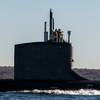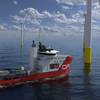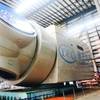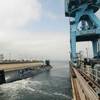SNAME Focused Panel Sessions, 2009 Meeting
The focused panel sessions at the Society of Naval Architects and Engineers (SNAME) Annual Meeting and Expo (October 21-23 at the Rhode Island Convention Center in Providence, Rhode Island) will feature four timely topics: Electric Ships; Renewable Energy from the Oceans; Unmanned and Autonomous Ships of the Future; and Ship Efficiency in the Greenhouse Gas Era.
Each two-hour panel session will be chaired and moderated by experienced SNAME members. Each session will have three leading experts who will make thirty minute presentations on their area of expertise, followed by a moderated thirty minute discussion period which will include questions and answers from the audience. Two of the panels will be held in parallel sessions to begin the technical program on Thursday, October 22 from 8:30 am to 10:30 am and two parallel sessions will conclude the 2009 technical program on Friday, October 23 from 2:30 pm to 4:30 pm.
Electric Ships – Three Shipbuilders’ Perspectives
Thursday, Oct 22, 8.30a-10.30a
Moderators: Robert Keane, Ship Design USA, CAPT Norbert Doerry, USN (Ret), Naval Sea Systems Command
The age of the electric ship is upon us. Both naval ships and commercial vessels are increasingly using integrated power systems employing electricity to power propulsion and ship service systems. These new capabilities offer opportunities to radically change the types and number of ships comprising future fleets meeting economic and security demands in very dynamic and interdependent business and defense environments.
David McMullen from General Dynamics NASSCO, San Diego, CA will describe his shipyard’s recent experience with the design and construction of a variety of electric drive ships.
Dr. D.S. Kong from Samsung Heavy Industries will discuss a wide range of electric ships designed and built in his company’s shipyard on Geoje Island, S. Korea.
Heikki Sipilä from STX Europe in Finland (formerly Wartsila, Kvaerner-Masa, and Aker Yards) will talk about the long history of STX Europe building electric ships, including icebreakers, cable layers and of course multiple cruise ships.
Ocean Alternative Energy
Thursday, Oct 22, 8.30a-10.30a
Moderators: David Gray, PE, The Glosten Associates, Inc., Seattle, Washington, Dr. Bruce Adee, Department of Mechanical Engineering, University of Washington, Seattle, Washington
The age of energy extraction from the ocean is changing form. Up until these last few years ocean energy was often equated with offshore energy, meaning the extraction of oil and gas offshore. But the new identity is the extraction of usable energy from the energies of the ocean itself, including tides, currents, waves, thermal layers and the winds blowing over the ocean surface. How is this to be accomplished is the question this special panel session will start to develop.
Christopher Barry, PE and Paul Kamen, PE, will set the stage with their paper titled, “An Overview of Ocean Renewable Energy.” The paper discusses and summarizes energy demand, the true cost of energy extraction, climate change, the “ecology” of renewable energy, and extraction concepts including hydrokinetic energy from waves and currents, offshore wind projects, ocean thermal energy concepts and marine biofuels.
Dr. Michael Raftery and Dr. Raju Datla, both from Stevens Institute of Technology, will combine engineering and economic issues with their paper titled, “Key Engineering Issues for Economically Viable Ocean Wave Energy Conversion.” Their paper brings to the discussion an issue that is often overlooked by ocean energy extraction concepts and that is survivability.
Kevin Pearce and Stephen Geiger, from Bluewater Wind and Charles Nordstrom, from The Glosten Associates, will focus the discussion on the developments in offshore wind energy extraction. Their paper is titled, “State of the Art in Offshore Wind Energy Projects.” There are significant developments in this area in Europe and those projects inform the development of projects in North America.
Unmanned and Autonomous Ships of the Future Friday, October 23, 2.30p-4.30p
Moderators: Paul Hess III, Office of Naval Research, Christer Broman, ConocoPhillips Company
As we continue to expand our ocean horizons there are tremendous opportunities for the application of robotics, in and on the sea. Both remote-piloted and autonomous vehicles are already deployed to carry out a range of tasks and new vehicles and new capabilities are developing at a fast pace. The advent of unmanned ships being used for ocean transport and other duties, both naval and commercial, is seen as a possibility and something worth exploring although many technical and non-technical hurdles remain. This panel session will explore these opportunities and discuss the hurdles.
Dr. Wayne Neu from Virginia Tech will present work that he has been leading on robotic research at that institution relating to both surface and subsurface craft. He will discuss two autonomous underwater vehicles; the high-speed AUV and the Virginia Tech 475.
Rich Delpizzo of the American Bureau of Shipping will provide background on the evolution of the use of technology to reduce manpower on ships and to extend the capabilities of marine vehicles from a regulatory aspect.
Dr. Ioseba Tena, from Seebyte in Edinburgh, Scotland will make a presentation on how AUV operations can be improved through intelligent use of diagnostics and the world-model.
Efficient Shipping in the Greenhouse Gas Era
Friday, October 23, 2.30p -4.30p
Moderators: Keith Michel, Herbert Engineering Corp., Bruce Russell, Marine Lead, International Council on Clean Transportation Mitigation of climate change through reduction in CO2 emissions will require a global effort affecting all industries. Although shipping is a highly efficient mode for transporting cargo, expansion of international trade arising from globalization has led to substantial increases in CO2 emissions from ocean shipping. At this panel session, presentations will cover the background to CO2 emissions from shipping and the work being done at IMO, explore the challenges in developing effective design practices to achieve desired emission reductions and review some of the innovative energy efficiency developments being deployed by one of the world’s leading shipowners.
Phil Grossweiler of M&H Energy Services will present an overview of climate changes and greenhouse gas emissions from ships. Phil recently served as an ASME Congressional Fellow, providing input to Congresswoman Heather Wilson on energy security and climate change related issues.
A.P. Moller-Maersk is embarked on a comprehensive program of technical and operational measures with the goal of making the APMM fleet the most environmentally friendly while ensuring cost effective operation. This wide ranging program is presented in the technical paper, “An integrated approach towards cost-effective operation of ships with reduced GHG emissions”, co-authored by a team from Maersk Maritime Technology division (Jan Otto de Kat, Bo-Cerup Simonsen, Soren P. Arnberg, Palle B. Laursen, Lars R. Pedersen, and Jacob Buus Petersen).
As a contribution to SNAME’s Ad Hoc Panel on Greenhouse Gas Emissions and Ship Efficiency, the American Bureau of Shipping and Herbert Engineering Corp. are cosponsoring a study to assess the effectiveness of the proposed IMO Energy Efficiency Design Index (EEDI) in encouraging optimization of design. The paper, “Design Optimization to Mitigate CO2 Emissions”, summarizes the first phase of this study. The paper is co-authored by Kirsi Tikka and Yoshi Ozaki of ABS and John Larkin and Keith Michel of HEC.
(www.snameexpo.com)










